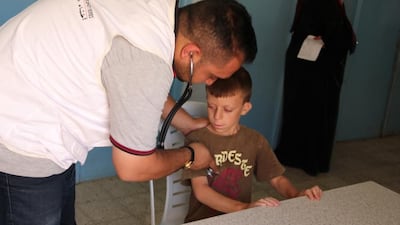The ban on international flights into Iraq's Kurdish region could severely affect aid delivery if restrictions continue, says the international medical humanitarian organisation Medecins Sans Frontieres (MSF).
An embargo on international flights to and from the autonomous region went into effect after Erbil rejected a call by Baghdad to surrender control of its international airports to the federal Iraqi government. It comes amid growing tensions between Erbil and Baghdad after Iraqi Kurds voted in favour of separation from Iraq in a highly controversial referendum of September 25 — a vote condemned as illegal by Baghdad.
"Any measures put in place must ensure that people can continue to access basic services like health care, and that carers and humanitarian workers can continue to access patients and communities in need of support in Iraq," MSF's head of mission adviser in Iraq, Wisam Al Nassar told The National.
"As a non-political, independent, neutral, medical humanitarian organisation, this is MSF’s primary concern at the moment."
At this point, however, MSF is able to continue its operations in northern Iraq with minimal disruptions.
"We are facing slight difficulties due to the restrictions of the flight ban on the northern Kurdish region, but they have not yet reached an extent that has blocked MSF’s operations," Mr Al Nassar said. "We are able to work so far. However, if those kinds of measures and restrictions continue for another couple of weeks then MSF will be concerned about its capacity to respond."
MSF — also known as Doctors Without Borders — provides medical assistance across 10 provinces in Iraq, reaching more than 130,000 patients, and employs more than 1,750 Iraqi staff as well as 225 international staff. Mr Al Nassar said operations are concentrated mostly in Nineveh province, in Mosul and the surrounding towns, and also in the disputed city of Kirkuk. The mission chose Nineveh province, near the Kurdish region, as its base because of the proximity of the airports in northern Iraq. But it operates all over the country.
"Our main response is to focus on the needs where no one else can cater to them, so as to not duplicate the work that other NGOs are doing in an area," Mr Al Nassar said. "We respond to the Kurdish region when we are needed."
______________________
Read more:
Iraqi Kurdistan is willing to discuss dispute over flight ban and border controls with Baghdad
Kurdish referendum could hurt efforts to help country's displaced
______________________
The work of MSF differs depending on locality. In Mosul for example, MSF focuses on long-term care and especially mental health. The people in Mosul bear the deepest mental scars, Mr Al Nassar said.
"People have been traumatised from years of conflict and wars. Mental health issues are not openly expressed in the Middle East due to the cultural stigma it holds. People are usually in denial of these kinds of issues."
MSF doctors have to not only adapt to this aspect of the local culture, but to accommodate it in their work.
"We have to find ways to establish great connections and build trust with the patient to give them the confidence they need to be able to express themselves so they can receive the right medical support. In Mosul we turn our focus to being inside hospitals because of the high levels of damage done to medical facilities, as well as the increasing number of people returning back to their homes."
Dr Gregory Keane, MSF's regional mental health adviser, told The National: "Any humanitarian response should have a mental health component integrated into it. Most international NGOs working in humanitarian settings consider psychosocial responses as part of their interventions."
All NGOs are increasingly conscious of the importance of taking care of the mental health of their team members, too, Dr Keane said, as they must also cope with the trauma of war. It starts with ensuring team members are trained and feel competent to carry out their jobs, then moves on to developing coping strategies, giving support and finally providing individual counselling for team members when appropriate.
Since the start of the Hawija offensive last month, 14,000 people have been forcibly displaced to towns in neighbouring districts of Kirkuk governorate. MSF is providing medical and trauma care to people arriving from Hawija through mobile clinics at Debis and Maktab Khalid entry point.
"In most cases patients need counselling and psychological support — we are progressing on that although it is not easy," Dr Keane said.
______________________
Read more:
Abadi declares victory in Hawija over ISIL
Displaced Iraqis facing 'protection crisis', UN says
______________________
A 37-year-old man told MSF: "Fleeing Hawija was so dangerous that people call it the road of death. We had to pass a narrow road between a mountain and a valley. Many people died on this road. Some of them fell in the valley. It took us 15-16 hours to escape the besieged town."
People living there had been under siege for almost three years, deprived of basic services including medical care, as the infrastructure and local facilities collapsed around them, and with humanitarian aid unable to reach them.


